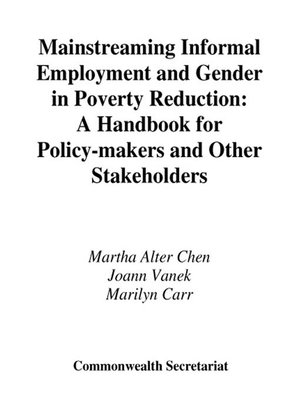Mainstreaming Informal Employment and Gender in Poverty Reduction
ebook ∣ A Handbook for Policy-Makers and Other Stakeholders
By Martha Alter Chen

Sign up to save your library
With an OverDrive account, you can save your favorite libraries for at-a-glance information about availability. Find out more about OverDrive accounts.
Find this title in Libby, the library reading app by OverDrive.



Search for a digital library with this title
Title found at these libraries:
| Library Name | Distance |
|---|---|
| Loading... |
Economic self-reliance is as important as political independence. Women want access to and ownership of resources; they want to be able to express and represent themselves, but more than anything they want to work. “If we work, we survive,” they say. —Ela Bhatt, Founder, SEWA
In September 2000, member countries of the United Nations, as part of the Millennium Summit, committed themselves to halve the proportion of the global population that survives on less than $1 a day by the year 2015. Many of those living in poverty work all of their lives without lifting themselves out of poverty. The International Labour Organization estimates that there are 550 million working poor and their numbers may double before 2015. Thus, if the Millennium Development Goal (MDG) relating to poverty is to be met, greater emphasis must be place on increasing both the quantity and the quality of employment opportunities for the working poor, and especially women. Yes, overall, the MDGs lack and explicit focus on employment or, more critically, on better employment for the working poor.
In this book, the authors highlight the lack of attention to employment, and especially informal employment, in poverty-reduction strategies and point to the links between being informally employed, being a woman or a man and being poor. They do this within the context of major changes in the nature of the work related to economic restructuring and liberalization and map out the impacts on different categories of informal producers and workers, both men and women. The book draws widely on recent data and evidence of the global research policy network called Women in Informal Employment: Globalizing and Organizing (WIEGO) as well as the knowledge and experience of the grassroots organizations in the network. Liberally scattered with practical examples, it provides a convincing case for an increased emphasis on informal employment and gender in poverty-reduction strategies, and sets out a strategic framework that offers guidelines for policymakers seeking to follow this approach.







